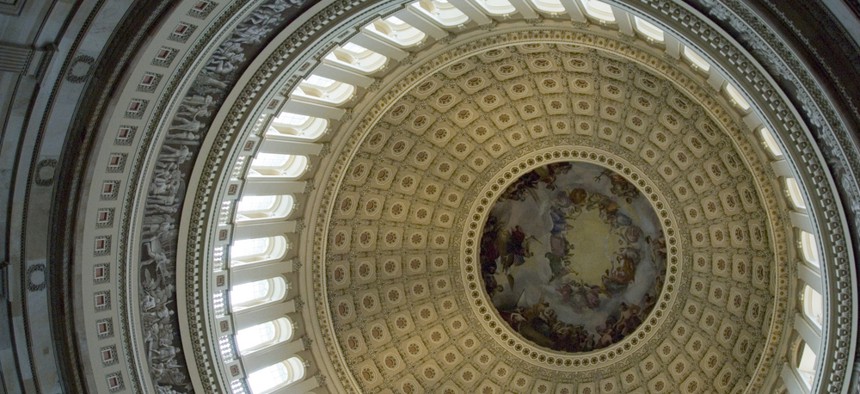Blocking the Vote in Congress
A big country has big problems—but the systematic failure of congressional leadership is making them impossible to tackle.
A friend of mine who has been a lobbyist for years—and wants to remain anonymous so he can continue doing it a while longer—recently made the argument to me that the current Congress is not, in fact, the least productive in U.S. history. But you do have to go quite a way back: He says the Ninth Congress, from 1805 to 1807, during Thomas Jefferson's second term in office, did even less, because the government had no money left after the Louisiana Purchase. (As a Louisianan, I think it was a worthwhile investment.)
In any case, it would not be hard to fill up a five-day symposium on Washington dysfunction; heck, it wouldn't take much effort to make it a semester-long course. Some problems are unique to the House of Representatives, others to the Senate, and still more to the White House. Then, of course, there are the more-systemic problems, such as the intense partisanship that has become so prevalent in the last 30 years, infecting both chambers, tainting relationships, and making addressing big issues more difficult.
One such problem can be laid squarely at the feet of congressional leaders—specifically, those who call the shots on what reaches the House and Senate floors and what doesn't. In the old days, the general sentiment was that if you didn't want to cast tough, controversial votes, you shouldn't have run for Congress. Making hard calls and having to deal with the consequences was part of the job description. Nowadays, however, that job description has changed to such an extent that one of the top responsibilities for the leader of a majority party in either chamber is to protect one's members from casting tough votes. The fact that a binding vote on the Keystone XL pipeline has not reached the Senate floor is a perfect example. And free-trade advocates should not hold their breath waiting for trade-promotion authority or the Trans-Pacific Partnership to make it to the floor for a vote; both measures are strongly supported by the Obama administration but viewed warily by certain Senate Democrats.
The folly of this is that a big country has big problems, and dealing with them usually involves making decisions that will alienate a segment of voters. To shield House members or senators from difficult votes is to effectively abdicate responsibility, to simply say, "No, thanks. I'll pass on dealing with this."
In the new political order, nothing is more important than either winning or holding a majority. The rationale is that the other party is so wrongheaded, if not evil, that if it were to prevail, then the immediate future—at least—of the Republic would be endangered, so anything that prevents the other party from capturing or holding a majority is justified, even necessary. Not unexpectedly, the result is gridlock.
For Senate Majority Leader Harry Reid, the preferred tactic is to "fill the amendment tree" to prevent consideration of anything that he doesn't want to reach the floor. The nonpartisan Congressional Institute describes it well: "At any given time, the Senate may only consider a certain number of amendments to a bill or to other amendments. Their order of priority can be depicted on a chart that looks like a number of branches coming from a tree trunk. When each line has an amendment, the 'tree' is full and no other amendment can be offered. The Senate Majority Leader has the right to be recognized first in a debate, so he can repeatedly offer amendments—whether they are substantial or not—to fill the tree. Republicans, naturally, have been fuming about Senator Reid's aggressive use of the tactic, but it also blocks Democratic amendments."
In recent weeks, Reid even filled the tree to prevent a vote on Democratic Sen. Kay Hagan's Sportsmen's and Public Outdoor Recreation Traditions Act, a fairly innocuous package of hunting, fishing, and public-lands measures. The testy relationship between Reid and Senate Minority Leader Mitch McConnell—the phrase "barely speaking to each other" is routinely used—only worsens the chamber's inability to act.
The parallel problem on the Republican side is the so-called Hastert Rule in the House, the legacy of former Speaker Dennis Hastert. It isn't actually a rule; rather, it's a practice of not bringing a measure to the floor unless it has the support of a majority of the majority party's members. Thus the House, which was designed to have majority rule, now has plurality rule, subverting that chamber's ability to get things done.
Much of this is rooted, of course, in a public that is more polarized along partisan lines than ever before. The divisions in Congress are mimicking the problems of an increasingly divided America. The sharp division we see today encourages leaders to behave in ways that their predecessors would have despised.
This article appears in the July 26, 2014 edition of National Journal Magazine as Blocking the Vote.
(Image via Condor 36/Shutterstock.com)



